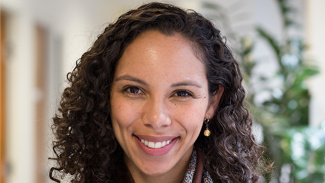Lauren Foukes Shaughnessy, BBA ’06/MBA ’12: Building More Equitable Communities for All

Lauren Foukes Shaughnessy, BBA ’06/MBA ’12, believes that the most sustainable communities are the ones that work together.
Shaughnessy is a manager at the San Francisco office of The Bridgespan Group, a social impact advisor to nonprofit organizations, philanthropists, and investors. The firm, which began as the nonprofit arm of Bain Consulting, provides strategy consulting and leadership development to address opportunities and challenges relating to social impact.
One of the clients she worked with over the past year expressed an interest in making a larger impact through philanthropy. Part of working with individuals is helping them find opportunities that align with their values, Shaughnessy said.
“It starts with asking them to help us understand their values,” she said, noting this client placed a high importance on trusting organizational leadership and centering equity. “What does that look like when you think about giving? One is providing unrestricted dollars to donors and not saying, ‘I’m giving money to this specific program.’ Unrestricted dollars show time and time again that organizations can invest in the capacity that they need to support their mission. So many donors do not give unrestricted dollars. That’s one way that trust is going to manifest.”
Lasting lessons
Raised in Metro Detroit by a single mother who emphasized helping others in the community, Shaughnessy says Michigan Ross’ commitment to social impact was one of the reasons she returned to Ann Arbor for her MBA.
“When I was looking at business schools in 2010, there were only a handful of programs that appeared to have a solid curriculum for students interested in the intersection of business and social impact,” she said, noting Ross finance Professor Gautam Kaul was an influence on her. “What stood out to me about Ross was that not only was there a solid curriculum in place with dedicated professors, but students also seemed to actually be getting internships and full-time jobs pursuing this type of work. I knew I wanted a career in the social sector and Ross really did seem like the best launching point for that.”
Shaughnessy said the Social Venture Fund gave her an appreciation of the work that goes into social impact.
The fund "is where I got my greatest education,” Shaughnessy said. “Looking at social venture enterprises and understanding how they are tackling these issues seen in the community, and thinking of communities that haven’t been invested in and external factors they couldn’t control, whether it’s economic, or systemic racism. The Social Venture Fund made me realize what levers you have to pull when you’re thinking of economic development, or how you go about closing racial disparities across educational outcomes.”
Disrupting traditional philanthropy
When determining a donor’s giving strategy, identifying disparities in the traditional philanthropy models is part of the consulting process, Shaughnessy said.
“As a firm, we identify traditional disparities and funding for BIPOC (Black, Indigenous, people of color)-led organizations,” she said. “These are smaller organizations — because they’ve been chronically underfunded for decades — but are still able to serve their communities. Without access to the philanthropic community that some of their white-led counterparts have had, these organizations have not had the opportunity to grow in the same way.”
Considering those factors is part of how Shaughnessy and The Bridgespan Group are disrupting philanthropy. “We try to push them to unwind some of the ways that institutional philanthropy has shaped over the past several decades,” she said. “That’s what’s exciting about working with individual philanthropists —there is more room for that shaping as opposed to when you’re working with a big foundation client, where strategies evolve more slowly.”
Although the racial equity and civil rights movement of 2020 put these issues front of mind for many people in America, Shaughnessy said there is still an urgent need for more philanthropy targeted at BIPOC-led organizations.
“Even with an increase in attention given the events of 2020, racial equity and racial justice funding is grossly behind compared to other fields, so there is a need to overinvest,” she said.
Working toward a more equitable world
Shaughnessy is eager to begin a “cradle to career” project in a Midwestern city where Bridgespan will work with a collaborative of nonprofits, businesses, government entities, and school systems on improving life for children. The ultimate goal is to create a thriving environment where race is no longer a predictor for life outcomes.
“We’ll look at strengthening outcomes for a community across all these dimensions: education, health, reduction in crime, and workforce development,” she explained. “How do you work on all these pieces at the same time, and what does it look like to work in collaboration to bring up a neighborhood or a whole city?”
These types of place-based projects are invigorating to Shaughnessy. “These organizations collaborating to collectively improve their communities is at the heart of it all. We all live in communities and have to work together to make things better for children, seniors, and all residents.”
Working together to improve future prospects for everyone: Although Shaughnessy admits it’s hard work, it’s clear it’s the right work for her.







